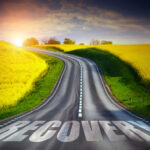Content warning: Suicide
One of the last lines in the movie, The Divine Secrets of the Ya Ya Sisterhood is “Old wounds heal, pal.” I believe that to be true. And I believe my old wounds are in the process of healing.
I mentioned in my first post that I was working through my own childhood trauma with a therapist. For several years, I had wanted to work with someone who was skilled in EMDR (Eye Movement Desensitization and Reprocessing). Last February I got that opportunity. I was referred to an excellent therapist.
But let me back up a little…or actually a lot.
The most impactful childhood trauma I experienced was my father’s mental illness that ultimately ended in him taking his life when I was 10 years old. [Here my focus is on my own experience, but I want to acknowledge my empathy for my parent’s own trauma and will address that connection in a later post.]
Things were very different back then. I never saw a counselor as a child. And there was so much shame surrounding a family member committing suicide that it was hardly ever talked about.
When I was older, I did a lot of work on my own—reading books about surviving the suicide of a parent, writing about it, talking it through with a few trusted friends. In junior high, I even wrote a poem about my dad’s suicide. Eventually, I thought I had it sorted out. I could talk about it without being emotional.… Read the full post “Old Wounds Heal, Pal”
